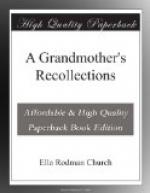She showed me these articles, which were extremely rich and massive, and the old lady always kept them carefully locked in a capacious side-board; never taking them out except to look at.
“Aunt Henshaw, did you ever see a lord?” I inquired.
“Plenty of them,” was her reply, “lords were as thick as blackberries during the Revolution.”
“How did they look?” said I.
“Very much like other people—and often pretty distressed.”
I was then surprised at this information, but I have since learned better; for I have seen the House of Lords in England, and they are, for the most part, a common, uninteresting-looking assembly.
“There was a Lord Spencer,” continued my aunt, “a very wild young man, who was constantly committing some prank or other—though always strictly honorable in repairing any damages he occasioned. He once, for mere sport, shot a fine colt, belonging to an old farmer, as he was quietly grazing in the field. Even his companions remonstrated with him, and endeavored to prevent the mischief; but he laid them a wager that he should not only escape punishment, but that he would even make the old farmer perfectly satisfied with his conduct. They accepted his bet, and anxious to see how he would extricate himself, they accompanied him to the residence of the old farmer.
“That is a very fine colt of yours,” began the young lord, “I should like to purchase him.”
“He is not for sale,” replied the farmer, shortly.
“I suppose not,” rejoined the visitor. “But what would you value him at in case any accident happened to him through the carelessness of others? What sum would pay you for it?”
“A hundred dollars would cover his value,” said the farmer, after some consideration, “but has any thing happened to him, that you ask these questions?”
“Yes,” replied the lord, “I have unfortunately shot him—and here is two hundred dollars as an equivalent.”
Lord Spencer won his wager, for the farmer had made at least a hundred dollars, and being extremely fond of money, he could not regret the loss of his colt. “This is a specimen, Amy, of what lords are; so do not go to forming any exalted notions of them, as of a superior race of beings. It was very cruel in Lord Spencer to shoot the poor animal—but it was honorable in him to make up the farmer’s loss, for it doubled the amount of wages he gained; yet to sum up the proceeding, it was wrong—for besides killing an inoffensive animal, it did not belong to him.”
Aunt Henshaw seldom failed to point out the right and wrong in her stories, for she feared that I would be carried away with whatever was most dazzling, and thus form erroneous impressions. It is an excellent maxim that “people should be just before they are generous;” and did all bear this in mind while admiring actions that often dazzle with a false glitter, they would assume a totally different appearance.




